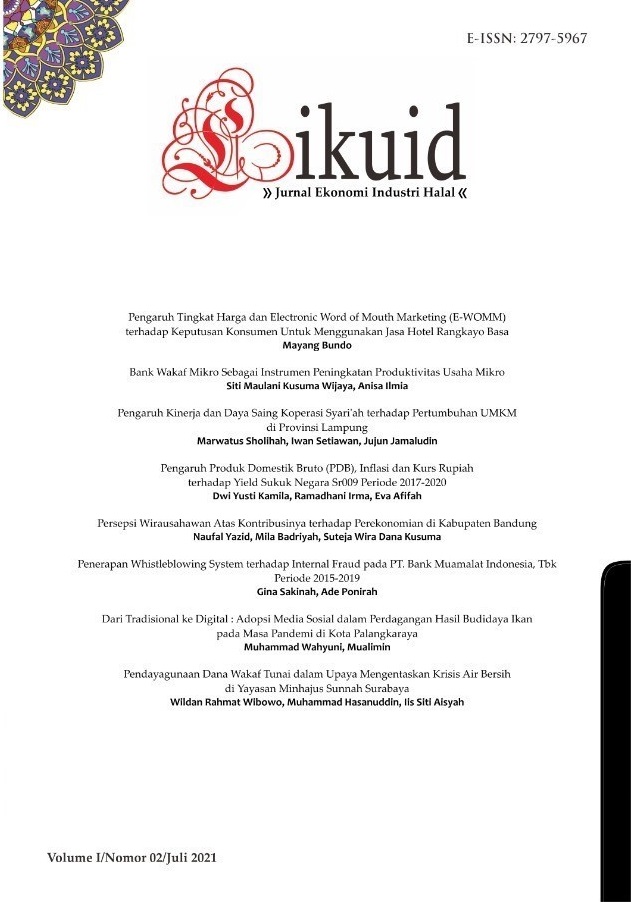PENGARUH TINGKAT HARGA DAN ELECTRONIC WORD OF MOUTH MARKETING (E-WOMM) TERHADAP KEPUTUSAN KONSUMEN UNTUK MENGGUNAKAN JASA HOTEL RANGKAYO BASA
DOI:
https://doi.org/10.15575/likuid.v1i2.14153Abstract
This study aims to determine the effect of price levels on consumer decisions, the influence of Electronic Word of Mouth Marketing (E-WOMM) on consumer decisions and the influence of price levels and Electronic Word of Mouth Marketing (E-WOMM) on consumer decisions to use Rangkayo Basa Hotel services. The method used in this study is a descriptive method with a quantitative approach. The analysis used is simple regression analysis, multiple linear regression with the classic assumption test t test and f test, for data processing used SPSS for Windows version 23. The data used is data Based on the questionnaire technique at Hotel Rangkayo Basa Based on the results of the study, the researcher came to the following conclusions: 1) The results of hypothesis testing showed that the tcount was 5.853 and ttable 1.985 because tcount> ttable, the first hypothesis was accepted meaning that there was an influence of price levels on consumer decisions. 2) Electronic Word of Mouth Marketing (E-WOMM) partially influences the consumer's decision as evidenced by the tcount of 7.724 and ttable of 1.985, the second hypothesis is accepted. 3) Simultaneously with the results of the significance test or F test, the F count was 43.466 and the F table was 3.09 with a significant value of 0.000%. Then the hypothesis is simultaneously accepted meaning that there is a positive influence between the price level and Electronic Word of Mouth Marketing (E-WOMM) on the consumer's decision to use sharia hotel services in the city of Padang.
Keywords: Price Level, Electronic Word of Mouth Marketing (E-WOMM), Consumer Decisions
References
Abdul, Rasyid. (2019, September 24). Pariwisata Syariah. business-law.binus.ac.id.
Al-Hafizh Ibnu Fajar al-Asqalani. (2007). Terjemahan Lengkap Bulughul Maram. Akbar Media.
Amalia, E. (2010). Sejarah Pemikiran Ekonomi Islam. Gramata Publishing.
Handoyo, W. (2020, Februari 13). Wawancara General Manager Hotel Rangkayo Basa [Komunikasi pribadi].
Henning-Thurau et.al. (2004). Electronic Word Of Mouth Via Customer Opinion Platforms: What Motivates Consumer to Articulate Themselves on the Internet. 18 No.1.
Husein Umar. (2000). Riset Pemasaran dan Perilaku Konsumen. PT Gramedia Pustaka Utama.
Ibnu Taimiyah. (1993). Majmu Fatawa (Vol. 29). Matabi’.
Imam Ghozali. (2005). Aplikasi analisis multivariati dengan program SPSS. Badan Penerbit Universitas Diponegoro.
Jalivland, M.R dan Samiei. (2012). The Effect of e-WOM on Brand Image and Purchase Intention. 30 No.4.
M. Taufiq Amir. (2005). Dinamika Pemasaran: Jelajah dan Rasakan. PT. Raja Grafindo Persada.
Peraturan Menteri Pariwisata dan Ekonomi Kreatif Republik Indonesia No. 2. (2014). Pedoman Penyelenggaraan Usaha Hotel Syariah, Pasal 1 Poin 3.
Rifa’at al-Audi. (1985). Min al-Turats: Al-Istishad li al-Muslimin (5 ed.). Rabithah ‘Alam al-Islami.
Sugiyono. (2009). Metodologi Penelitian Bisnis. Alfabeta.











